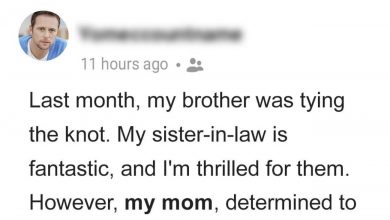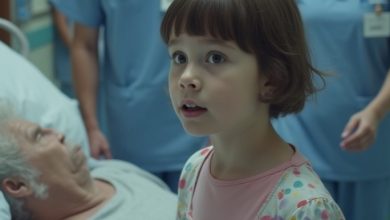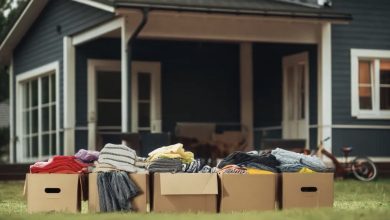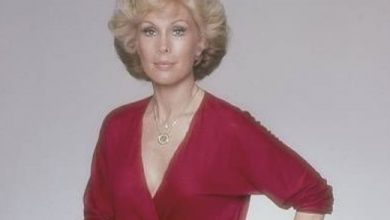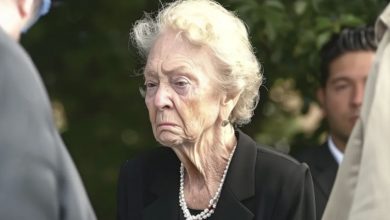Following my husband’s funeral, my son left me on a lonely road and told me, “This is your stop.”
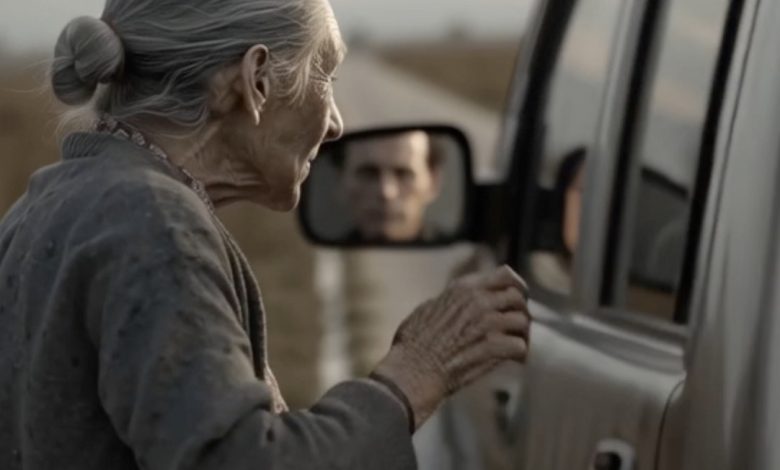
My name is Eleanor Grace Whitmore, and I’m sixty-eight years old. For almost fifty years, I filled the roles of devoted wife, caring mother, and the steady heartbeat of Hazelbrook Orchards, our modest organic apple farm nestled in the rolling hills of Pennsylvania. Though arthritis has left my fingers stiff, I can still feel the memory of dew on my skin as I and my husband, Richard, pruned our trees at dawn. Three weeks ago, I laid him to rest after his courageous, fourteen-month struggle against pancreatic cancer.
Richard and I built everything side by side—the orchard that fed us, the farmhouse that sheltered us, and the family that gave our lives meaning. In his final days, he begged me to shield our children, Darren and Samantha, from the full weight of his illness. “Let them live without this sorrow for as long as we can,” he whispered one afternoon, his voice barely above a breath. So I kept my tears hidden until the very end, hoping the pain of losing him would draw our family closer.
When the funeral concluded, and the last of our relatives and friends drove away, I hoped Darren and Samantha would gather around me in grief—and perhaps find some comfort in one another. Instead, I watched them stand perfectly still near the graveside, their faces set in expressionless masks. They offered silent nods of sympathy to me but exchanged furtive glances between themselves, like two business partners calculating profit and loss. The moment I most needed their compassion, I saw instead the cold workings of an inheritance.
That next morning, I rose early, as I always did, and made a pot of my husband’s favorite coffee—strong and black, with just a touch of cream. I poured two mugs, carrying one to my bedroom window to savor the sunrise, and setting the other on the kitchen table. I settled into my usual chair, expecting my children to come down for a shared cup and a quiet talk about next steps, but instead I heard the slow click of high heels and polished loafers on the floor above.
Moments later, Darren appeared at the top of the stairs, dressed in a tailored navy suit over a crisp white shirt. His hair was neat, his face composed, and he clasped a steaming mug of coffee in hand. Samantha followed in a smart business dress, her hair in a sleek bun and a tablet under her arm. They looked every bit the corporate executives they’d become.
“Mom,” Darren said, lowering himself into the chair across from me, setting his mug down with deliberate care. “We’ve been in discussion, and we believe it’s time to start settling Dad’s estate—dividing the assets, the farm, the house.”
He spoke with such calm authority that I almost didn’t recognize my own son. “I’m merely being practical,” he continued. “Running the orchard alone at your age would be unwise. And this house… it’s far too large for you to manage on your own.”
The words hit me like falling apples. My age. That phrase echoed in the room, heavy and hollow. Me—Eleanor Grace Whitmore—the woman who had driven tractors through winter snow, balanced budgets on the kitchen table, and delivered crisp apple crates to food pantries for decades.
Samantha placed her own cup on the table. Her tone was smooth, practiced. “We only have your best interests at heart,” she said. “We’ve found a lovely retirement community—Sunnyvale Estates—just two hours south. It’s perfect for someone who deserves comfort and care.”
Then Darren drew a leather-bound folder from his briefcase and slid it across the table. “Dad and I talked this over last year,” he said. “He signed these documents, transferring ownership of the orchard and home to me and Melissa.”
I picked up the papers, my trembling fingers turning the pages. They were printed on Darren’s corporate letterhead. There, in perfect, neat script, was Richard’s signature—too steady, too exact for a man who had spent his last days battling pain in a hospital bed. “These aren’t from our family attorney,” I said gently.
Darren gave a tight smile. “He was very clear in his intentions. He was fully aware when he signed.”
Samantha leaned forward. “And there’s already a developer offering seven million dollars for the land,” she added, her voice nearly cheerful. “We’d be set for life, and you’d never have to worry about a thing.”
I laid the folder back down, closing it with deliberate calm. “You want to sell the orchard—turn your father’s life’s work into something he would never have recognized,” I said softly. “You would replace rows of apple trees with roads and rooftops. You’d destroy the very legacy he spent a lifetime creating.”
“Mom, that’s not fair,” Darren replied with a sigh. “You know the orchard business is changing. It’s not sustainable on its own forever.”
A slow burn of anger rose in me. I looked from one child to the other, my grandchildren’s future twisting in my chest. “Very well,” I said, voice steady but cold. “Then show me the will.”
Darren leaned forward again and nudged the folder toward me. I recognized the move—he assumed I would grab it and sign away my life’s work. But I did not reach. Instead, I stood up and folded my arms. “I’m going to bed,” I told them. “We’ll continue this tomorrow.”
But already I knew there would be no tomorrow talk. They had set their plan in motion.
The next morning, I awoke before dawn and dressed quietly. By the time the sun rose, I could hear the front door open and the patter of Darren and Samantha’s shoes on the porch. They had packed a small suitcase—one that was not mine—and left it by the door.
“Mom,” Samantha called up the stairs in her bright voice. “We’re ready to leave for Sunnyvale. We thought we could drive you there today, so you could see it.”
I stood in the entryway, wearing my own faded denim jacket over a simple blouse. “I’m not going to a retirement community,” I said.
Darren’s face tightened as he checked his watch. “Mom, please. The documents have been filed. The developer closing is next week. You cannot remain here.”
“This,” I gestured around me at the orchard’s grand front door, “is my home.”
He offered a curt nod. “It’s our home now, according to the paperwork.”
I took a steady breath. They had assumed I was powerless, reliant on their mercy. I did not answer. I walked past them out to the porch and slid into the passenger seat of Darren’s SUV. They drove out of the orchard’s long driveway and down the winding country road. The morning air smelled of apple blossoms and wet earth.
Instead of turning toward the highway that led south to Sunnyvale Estates, Darren guided the car onto a narrow, gravel back road. A stiff breeze rolled dust into our windows, and the fields stretched flat and empty on either side.
Twenty minutes later, Darren pulled over near a stand of trees with no houses in sight. He cut the engine and turned to me in the passenger seat. His face was hard, set. “This is where you get off, Mom,” he said.
Samantha’s bright face faltered for a split second. “Darren—”
He shook his head. “We can’t have you causing scenes. It’s simpler if we leave you here. There’s a gas station about five miles up the road. You have your meds and clothes. We’ll be fine.”
He reached over, opened the door, and, without another glance, drove away. Their SUV vanished around a bend, leaving me alone on a dusty road with an empty suitcase by my side.
For a moment, I stood frozen, the early sunlight flickering through the leaves. My heart ached at the betrayal. My children—my own flesh and blood—had abandoned me. Yet beneath the shock, a fierce resolve took hold.
I stepped from the curb and picked up the suitcase. My arthritic fingers fumbled with the handle but did not fail me. I began to walk—not toward the gas station, but the nearest town. Each step carried me farther from their plan and closer to my own.
Hidden in my purse was a secret they did not know: the original deed to those twenty acres of Hazelbrook Orchards, recorded in my maiden name. Along with it were my passport, my birth certificate, and a small fireproof box I’d placed in our home’s safe years ago. Inside were the deeds to a separate parcel of land I had purchased before I married Richard—land that held the only stream in these parts, the water source vital to any development.
They believed they had left me helpless—but they hadn’t accounted for that hidden deed, or the water beneath it. They thought they could force me into a retirement community, plow under my home, and pocket the money. They didn’t realize I had built my own safety net long ago.
After two hours of walking, the buildings of Miller’s Gas and General Store appeared on the horizon. Ray Miller, the owner, stood behind the counter when I walked in, dust on my clothes and determination in my eyes.
“Eleanor?” he said, astonished. “You look like you’ve been through the wringer. What happened?”
“I need to make a call,” I replied, and he led me into his small office where an old landline phone still rang.
I dialed the number of our family’s longtime lawyer, Harold Jennings, from memory. “Hello, Eleanor,” he answered. “I’ve been trying to reach you—Darren filed some paperwork yesterday.”
“I’m at Miller’s Gas in Barnesboro,” I said briskly. “I need your help—and this has to be discreet.”
“Stay where you are. I’ll meet you there in an hour,” Harold said.
He arrived in his blue sedan, carrying my original deed in a legal folder. He greeted me with a solemn nod. “Let me see what they filed,” he said, glancing at the second, forged set Darren had left at the house.
Within minutes, Harold confirmed my suspicion: Darren’s documents were fraudulent, and the genuine deed—recorded under Eleanor Grace—granted me sole control over the water rights and orchard property. Without that, the developer couldn’t obtain permits, and the sale was effectively dead.
That afternoon, Harold filed an injunction to halt any transaction. A courier delivered it to the developer’s office, and within hours, the deal collapsed when the company realized they could not proceed without the water rights.
Word reached me later that evening in the form of a frantic text from Samantha: “Mom, please, let’s talk. We didn’t know about the second deed. Can we fix this?”
But I didn’t respond. Darren called Harold directly, demanding explanations. Harold calmly explained the legal situation and that all further communication would go through his office.
“They’re scrambling,” Harold told me over coffee. “They realize they’ve backed themselves into a corner.”
“They underestimated me,” I said, stirring the warm brew. “They thought I had nothing left.”
“No,” Harold replied. “You had everything.”
I chose not to return to the farmhouse that night. Instead, I moved into a small apartment above the town bakery—not my beloved home, but a place of my own. I spent my days teaching quilting classes, volunteering at the local library’s gardening program, and caring for the orchard’s upkeep through the cooperative that now held the water rights.
Over the next weeks, I watched Hazelbrook Orchards bloom once more. The saplings we planted together with Richard last spring spread tender green leaves. The cooperative’s young farmers honored my husband’s legacy and my own. I donated the water rights into a trust to ensure no developer could ever seize them.
My children saw me only from a distance—Darren once drove by without stopping, Samantha’s texts went unanswered. I did not seek their forgiveness; I sought my own peace.
I had walked away from their betrayal onto a dusty road—and walked into a new life of independence, purpose, and quiet dignity. They had thought me too old, too frail, too trusting. Yet it was my patience, my long memory, and the quiet strength I had cultivated over decades that saved the orchard.
I had learned that day that I did not need their approval to be strong, nor their permission to own my future. Before I was a wife, a mother, or a widow, I was Eleanor Grace Whitmore—a woman who built a home from soil and sweat and the promise of tomorrow.
As the sun set over the orchard, I stood on the edge of those fields and breathed deeply. They had tried to break me, to cast me aside on a lonely county road. But I had guarded my life’s work with the same care I once pruned my trees. And when the moment came, I reclaimed not just land, but my own voice and the dignity I had earned.
They thought they had executed a plan, forcing me from my home. But in truth, they had shown me exactly who I was—and what I was capable of saving. I knew there would be no tomorrow conversation with Darren or Samantha. They were executing a plan.





